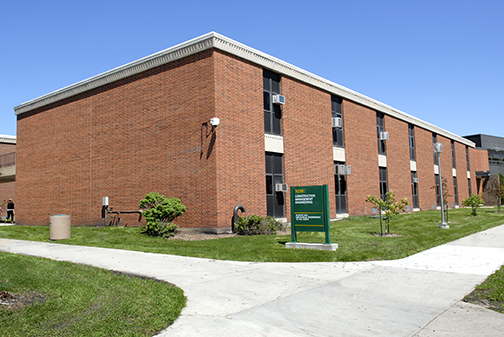Construction Engineering Major
Construction Engineering involves the planning, design, and management of construction facilities, such as highways, bridges, airports, railroads, buildings, dams, and reservoirs. The construction of such projects requires the knowledge of engineering, management, economics, and business. Construction Engineering is differentiated from Construction Management from the standpoint of the use of math, science, and engineering to design projects and processes and analyze problems. Construction Engineering is involved in a variety of construction disciplines, including: commercial, residential, transportation, and infrastructure systems. Construction Engineers are also involved in the engineering design of temporary structures, cost estimating, planning and scheduling, material procurement, selection of equipment, and cost control. Due to their diverse skills, there is a very high demand for Construction Engineers.
The Department of Construction Management and Engineering offers a Bachelor of Science degree in Construction Engineering which offers a blend of engineering and construction courses. The program is designed for those who want to work in the construction industry and enjoy the status of a professional engineer. A thorough knowledge of the physical sciences, math, and engineering is developed during the first two years followed by construction management and engineering courses. The technical side of the program is balanced with requirements in writing, humanities, social science, and communications. The Bachelor of Science degree in Construction Engineering is accredited by the Engineering Accreditation Commission of the ABET.
Program Educational Objectives (PEO)
The Educational Objectives of the Construction Engineering Degree Program describe the career and professional accomplishments that we expect our graduates to achieve early in their careers. Within the first few (3-5) years after graduation, we expect our alumni:
- To maintain a sustained program of continuing education and life-long learning with a focus on contemporary issues.
- To be productive construction engineers and/or construction managers who are pursuing or have attained professional registration.
- To be effective communicators who work on multidisciplinary teams.
- To be engaged engineering professionals who are aware of and comprehend the ethical, social, environmental, and economic impacts of engineering solutions.
- To be engaged citizens who become involved and seek leadership roles in professional societies and community organizations.
Student Outcomes (SO)
The Program Educational Objectives are further connected to 11 Student Outcomes, developed by ABET, which describe what students are expected to know and be able to do by the time of graduation. These outcomes relate to the skills, knowledge, and behaviors that students acquire in their matriculation through the program. The Student Outcomes are listed below:
a) An ability to apply knowledge of mathematics, science, and engineering to the field of Construction Engineering.
b) An ability to design and conduct experiments, as well as to analyze and interpret data.
c) An ability to design a system, component, or process to meet desired needs within realistic constraints such as economic, environmental, social, political, ethical, health and safety, and sustainability, with a focus on Construction Engineering systems, components, or processes.
d) An ability to function on multi-disciplinary teams.
e) An ability to identify, formulate, and solve Construction Engineering problems.
f) An understanding of professional and ethical responsibility within the general field of Construction Engineering.
g) An ability to communicate effectively.
h) The broad education necessary to understand the impact of Construction Engineering solutions in a global, economic, environmental, and societal context.
i) A recognition of the need for, and an ability to engage in life-long learning.
j) A knowledge of contemporary issues.
k) Ability to use the techniques, skills, and modern engineering tools necessary for Construction Engineering practice.
Plan of Study
IMPORTANT DISCLAIMER: This guide is not an official curriculum. This guide is a sample four-year degree plan of how students might plan this major with other degree requirements to complete their education in four years.Student plans will vary from this sample due to a variety of factors, such as, but not limited to, start year, education goals, transfer credit, and course availability. To ensure proper degree completion, enrolled students should utilize Degree Map and Schedule Planner in Campus Connection and consult regularly with academic advisors to ensure graduation requirements are being met.
# Waived if composite ACT is 21 or more
*To satisfy the Gen Ed Category B requirements, a student can choose between two options: ECON 105 plus an additional course within Category B OR ECON 201 and ECON 202. Both options satisfy the Gen Ed Catogory G.
** Refer to list of Construction Engineering Technical Electives (CE 400 Level Courses) Minimum 12 Credits)
Gen Ed Category description can be found on the General Education page.

